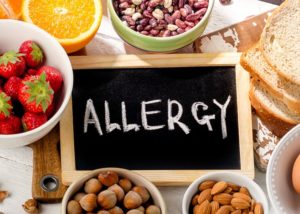Even if you’ve never had allergies before, you can develop new ones as you age. Your body and your environment constantly change, making it common for people to develop food allergies later in life. If you suspect a food is the cause of your allergic reactions, don’t waste years trying to self-diagnose. Instead, talk to a certified allergist about an oral food challenge.
What is an Oral Food Challenge?
An oral food challenge (OFC) is a medical procedure in which food is consumed slowly, in gradually increasing amounts, under close observation of an allergist, to accurately diagnose or rule out a true food allergy. This test can also be used to determine if a food allergy has resolved. In addition, it can be undertaken to define other adverse reactions to foods, such as intolerance.
Is Oral Food Challenge Safe?
A study was conducted by the American College of Allergy, Asthma, and Immunology (ACAAI) and they concluded that OFC, which is used in clinics to test people for food allergies, are very safe and rarely cause severe reactions. Lead author Dr. Kwei Akuete said that an oral food challenge is a very important tool for anyone who wants to know if they have a food allergy.
Because though this test can rarely cause a serious allergic reaction, it should only be conducted by an experienced allergist. It should happen at a medical facility with the appropriate medications and equipment.
Thorough guidelines and norms for OFCs were created by the medical community. Studies have shown that these tests are much safer when handled in this way. Indeed, thousands of OFCs have been performed worldwide with an excellent safety record.
Oral Food Challenge Test
During the food challenge, the suspected food is consumed in measured doses. The challenge begins with very tiny quantities that are unlikely to cause symptoms. The healthcare professional will watch you for any signs of a reaction during and after each dose.
If you have no significant symptoms, you will gradually receive larger and larger doses. If you show signs of a reaction, the food challenge will stop.
With OFCs, most reactions are mild, such as flushing or hives. Severe reactions are uncommon. You will be given medication to relieve the symptoms if necessary.
A negative food challenge is the lack of symptoms, after consumption of a full serving of the target food. If the test confirms that you do have an allergy to the food in question, your allergist will discuss ways you can avoid the food. He or she will also prescribe appropriate medications.
In some cases, OFCs are given to people who already have a known food allergy. For example, an allergist may order the test to find out if a patient has outgrown the allergy.
What to Do Before the Food Challenge?
- Plan ahead. The tests can take between 4-6 hours depending on if you develop an allergic reaction, so budget plenty of extra time.
- Stop taking antihistamines 5 days before the procedure, which could mask any symptoms or reactions. Talk with your allergist about any medications you’re on that might interfere with the results of the challenge.
- Make sure you are in good health and have a partially empty stomach prior to starting the food challenge. Food challenges are not conducted during a fever, severe illness, or flair of a chronic condition like asthma or eczema.
What to Bring to the Food Challange?
- Bring extra clothes in case you are cold, or your clothing becomes dirty.
- Your allergist will instruct you on the food and amount you should bring to the challenge. Typically it is prepared as plainly as possible, without contact or contamination by other potential allergens.
- Bring clear liquids, safe snacks and possibly a light meal, so that you are not overly hungry.
- Any other items that your allergist recommends. Check the list that they provide.
What Foods Are Commonly Challenged?
Oral food challenges are usually done using the actual food itself, such as:
- Dairy: Milk
- Heated Milk: A specific baked recipe that contains milk
- Eggs: Scrambled egg and/or French toast
- Baked Eggs: Specific baked recipe that contains eggs
- Grains: Flour, which is mixed with safe food such as applesauce or pudding
- Peanuts and Tree Nuts: Nut butter, specific nut, or nuts ground up to a flour consistency and mixed with a safe food
- Soy: Soy milk, which can be mixed with a safe liquid or served with safe chocolate syrup to mask the taste
- Fish: A cooked piece of the actual fish
- Shellfish: Typically a cooked piece of shrimp or crab
Only one food can be tested at a time in order to guarantee accurate results.
Takeaway
Food allergy can affect a person’s life in a variety of ways. A certified allergist can help you manage your allergies, and feel more informed, empowered and in control. An oral food challenge provides important information on the presence or absence of a food allergy, and the threshold at which symptoms occur, thereby increasing your quality of life. Most importantly, if you pass a challenge then this will expand your diet and add a variety of new options.
To learn more about oral food challenge, schedule your appointment with Dr. Amy Schiffman. She is a board certified allergist in Boca Raton, Florida.

